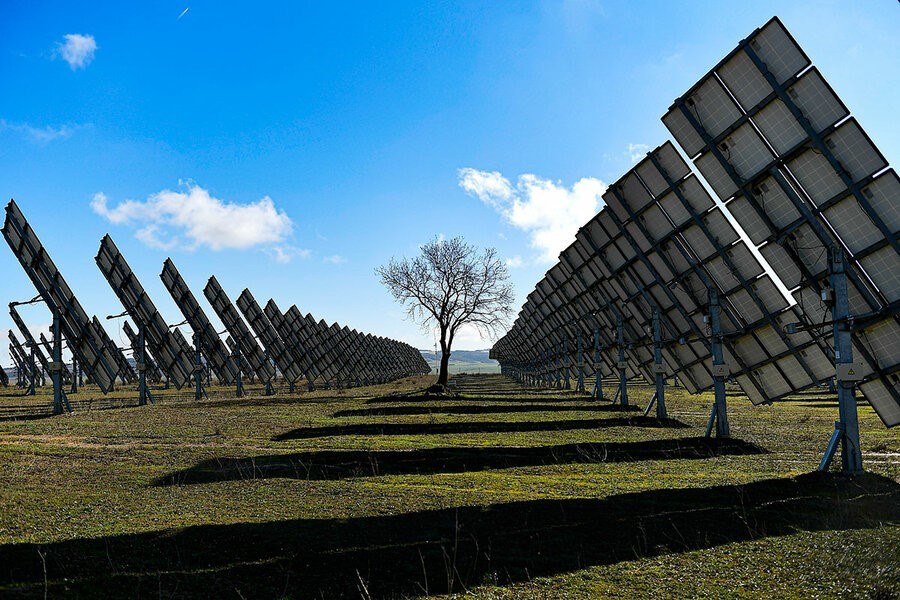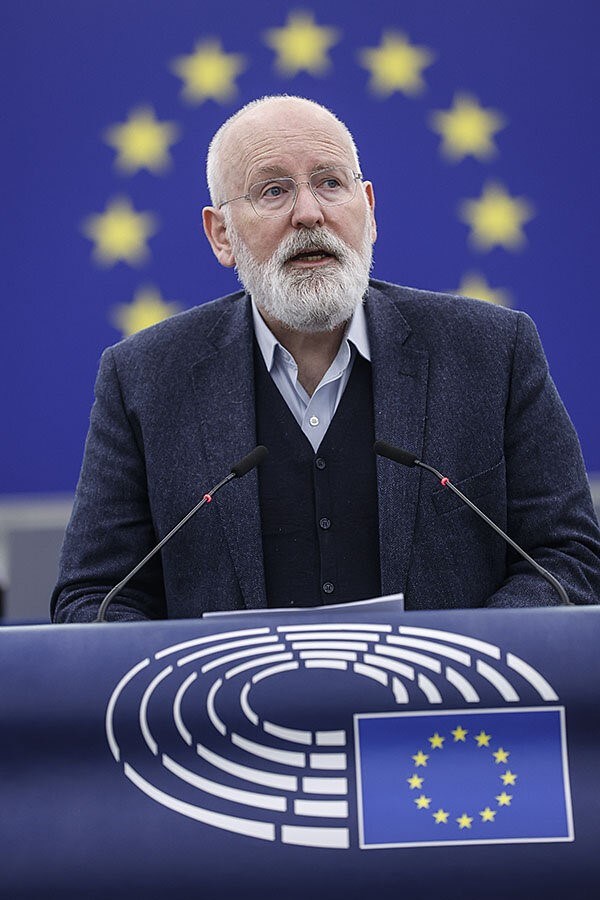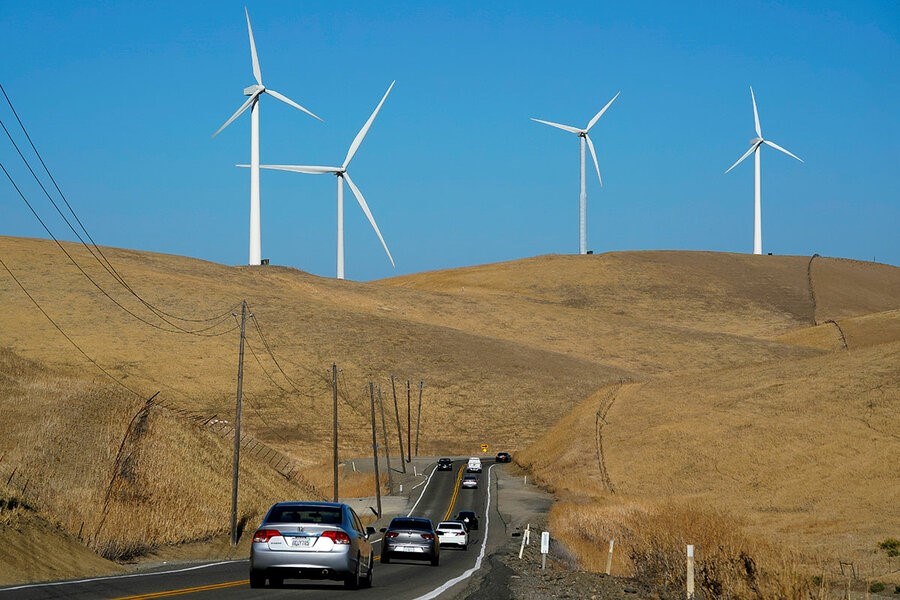REPRINTED WITH PERMISSION FROM THE CHRISTIAN SCIENCE MONITOR
 A tree is surrounded by solar panels in Los Acros, in northern Spain, on Feb. 24, 2023. Spain is building on its reputation in renewable energy to position itself as Europe's future leader in green hydrogen. Alvaro Barrientos/AP
A tree is surrounded by solar panels in Los Acros, in northern Spain, on Feb. 24, 2023. Spain is building on its reputation in renewable energy to position itself as Europe's future leader in green hydrogen. Alvaro Barrientos/AP
March 2, 2023
Of all the aftershocks from Vladimir Putin’s attempted military takeover of Ukraine, one of the least likely could prove the most significant: a decisive global shift toward greener energy.
The trend had been building even before the Ukraine war, as businesses, investors, and political leaders began positioning themselves to reap the benefits of an economic future based less on fossil fuels, such as oil, gas, and coal, than on clean energy sources like wind, the sun, and hydrogen.
But the pace was nowhere near fast enough to reach the climate target that environmental experts say is needed to avoid the worst effects of global warming – limiting the Earth’s temperature rise to 1.5 degrees Celsius (2.7 Fahrenheit) above pre-industrial levels.
That’s still a very tall order, but there are growing signs that Mr. Putin’s war has brought the transition to a lower-carbon energy future closer – by five or even 10 years, according to one recent report by Britain’s Economist newsmagazine.
 Jean-Francois Badias/APFrans Timmermans, the European Union climate czar, says Russian President Vladimir Putin has unwittingly accelerated the green transition of the 27-nation bloc, as the EU cut its dependency on Russian fossil fuels and boosted renewables over the past year.
Jean-Francois Badias/APFrans Timmermans, the European Union climate czar, says Russian President Vladimir Putin has unwittingly accelerated the green transition of the 27-nation bloc, as the EU cut its dependency on Russian fossil fuels and boosted renewables over the past year.
It has certainly boosted funding for greener energy and technology. Another report, published by Bloomberg’s NEF research group in January, calculated that last year’s total world investment in clean energy was, for the first time, roughly equal to the $1.1 trillion invested in fossil fuels.
And the green energy momentum seems set to grow. All three of the world’s fossil fuel powerhouses – China, the United States, and the 27-nation European Union – have been rolling out massive new subsidies to encourage investment in green power and technology.
The role that Mr. Putin’s war is playing in this has been complex, indirect, and – like so much else about his invasion – unintended.
Russia’s interests lie in more fossil fuel use, not less. Oil and gas are mainstays of its economy.
And the sharp decrease since the invasion in imports of Russian natural gas by its key customers – EU countries – has indeed led to a short-term increase in demand for coal, slowing a concerted international effort in recent years to phase it out.
The war’s main effect, however, has been to drive home the political price of energy dependency on a country that is ready, able, and determined to use it as leverage.
While Mr. Putin expected – or at least hoped – that western Europe’s enormous reliance on Russian gas would weaken its commitment to Ukraine, it has instead served as a wake-up call.
Alongside greater use of imported liquid natural gas from countries other than Russia, European countries are seeing an increased takeup of noncarbon energy sources, such as solar panels and heat pumps, which use outdoor air to heat homes.
Poland, for example, is a major user of coal, much of it traditionally imported from Russia. Air pollution had already been prompting greater use of solar panels and heat pumps. But since the Ukraine invasion, purchases of heat pumps have more than doubled.
Still, the key accelerator of the green energy transition has been government money – hundreds of billions of dollars’ worth of subsidies to develop, produce, and use green energy technology – deployed in deliberate policy shifts by Washington and the EU.
 Godofredo A. Vásquez/AP/FileVehicles move down Altamont Pass Road with wind turbines in the background in Livermore, California, on Aug. 10, 2022. Democratic lawmakers in California are introducing a package of climate bills aimed at holding corporations accountable for their greenhouse gas emissions.
Godofredo A. Vásquez/AP/FileVehicles move down Altamont Pass Road with wind turbines in the background in Livermore, California, on Aug. 10, 2022. Democratic lawmakers in California are introducing a package of climate bills aimed at holding corporations accountable for their greenhouse gas emissions.
Last year’s Inflation Reduction Act in the U.S. earmarked nearly $400 billion for clean energy subsidies, and the EU is moving in a similar direction. President Joe Biden has said he is committed to fighting climate change, and the EU has long taken a lead in international efforts to slow global warming.
But the EU and the U.S. are also anxious to avoid the political perils of relying on imported energy – a lesson painfully learned from the Ukraine war.
And they’re acting with an eye toward another potential dependence: on China.
China is the world’s second-largest economy. It is by far the largest source of carbon emissions. But it is also the world’s most generous source of green energy subsidies, having spent nearly $300 billion on them last year alone according to BloombergNEF.
And China is also the leading producer of solar panels and the batteries used in electric cars.
So while the Ukraine war has provided a major catalyst for global investment in green energy, it has also set the stage for a subsidy competition among the U.S., the EU, and China – a kind of climate change protectionism.
That could lead to supply bottlenecks as each of the players moves to build a robust, homegrown green energy economy.
And even last year’s record trillion-dollar investment in green energy worldwide remains far from enough to reach the international goal of net-zero emissions by 2050. That will require five times that amount every year by 2030, according to the Europe-based climate think tank E3G.
Yet the transition trend is now quickening. And that’s not just because the world is more aware of the dangers of climate change.
It is also because of a growing recognition of the political imperatives, and potential economic benefits, of moving toward a green energy economy.
And that is a message magnified, however tragically, by Vladimir Putin’s war.
Related stories
Page created on 3/6/2023 9:56:45 PM
Last edited 3/6/2023 10:08:28 PM
